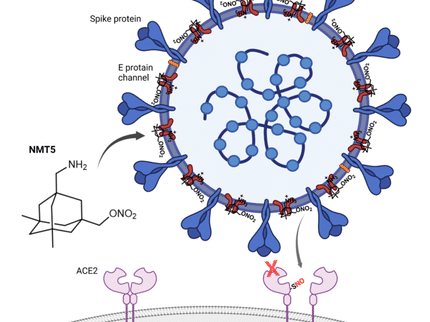Multiple sclerosis: plant peptide could prevent onset of the disease
MedUni Vienna has made a crucial development in the treatment of multiple sclerosis (MS): Together with his team and the research group led by Gernot Schabbauer, international partners from Australia, Germany and Sweden, Christian Gruber, Chief Researcher at the Center for Physiology and Pharmacology has demonstrated in an animal model that, following treatment with a specially synthesized plant peptide (cyclotide), there is no further progression of the usual clinical signs of multiple sclerosis. Gruber: "The one-off oral administration of the active agent brought about a great improvement in symptoms. There were no further attacks of the disease. This could slow down the course of the disease in general."
MS is a chronic inflammatory autoimmune disease of the central nervous system, in which the insulating myelin sheaths around the nerve fibres are destroyed. The disease progresses in the form of attacks or episodes and is currently incurable. An episode is defined by the occurrence of new symptoms or flare-ups of pre-existing ones. Each episode is associated with immediate or deferred deterioration in the patient's condition. The mechanism of inflammation in the nervous system is partially understood. Based on this knowledge, there are treatments to slow down progression of the disease but these have significant side effects, particularly in long-term therapy. It is estimated that around 2.5 million people are affected by MS worldwide, around 8,000 of these in Austria.
The discovery made by the Viennese scientists now offers hope that the disease can be halted at a very early stage or, at the very least, its progression greatly retarded. "As soon as functional neurological problems occur and an MRI (Magnetic Resonance Imaging) scan identifies early pathological changes in the central nervous system, the drug can be given as a basic therapy. In an animal model for MS, symptoms were considerably reduced by the oral administration of cyclotides. It is therefore possible that we could extend the interval between episodes or possibly prevent an onset of the disease," say Gruber and Schabbauer, summing up of the central finding of the study.
On the basis of this development, MedUni Vienna, together with Freiburg University Hospital has filed patent applications in several countries and licensed them out to Cyxone, a company they have set up to carry out further development. The aim of this collaboration is to develop a safe, orally active drug for treating multiple sclerosis. A Phase I clinical trial for this could start at the end of 2018, says Gruber.
Cyclotides: easily available and orally deliverable
Cyclotides are macrocyclic plant peptides that can be isolated from all the main plant families (e.g. coffee plants, cucurbits or even grasses and plants of the nightshade family) and therefore represent a large and wide-ranging group of natural substances. A further advantage: the medicine obtained from them can be taken orally. Many of the current MS treatments in common use have to be administered intravenously.
The mode of action of cyclotides was discovered three years ago, also by scientists at MedUni Vienna, in collaboration with researchers from Freiburg University Hospital: they suppress the messenger substance interleukin-2 and hence the division of T cells, which act as "killer" or "helper" cells in the human immune system response. Hence, cyclotides could also possibly be used to treat other diseases characterized by an overactive, misdirected immune response, such as rheumatoid arthritis, for example.
Original publication
Kathrin Thell, Roland Hellinger, Emine Sahin, Paul Michenthaler, Markus Gold-Binder, Thomas Haider, Mario Kuttke, Zita Liutkevičiūtė, Ulf Göransson, Carsten Gründemann, Gernot Schabbauer and Christian W. Gruber; „Oral activity of a nature-derived cyclic peptide for the treatment of multiple sclerosis“; PNAS


















































